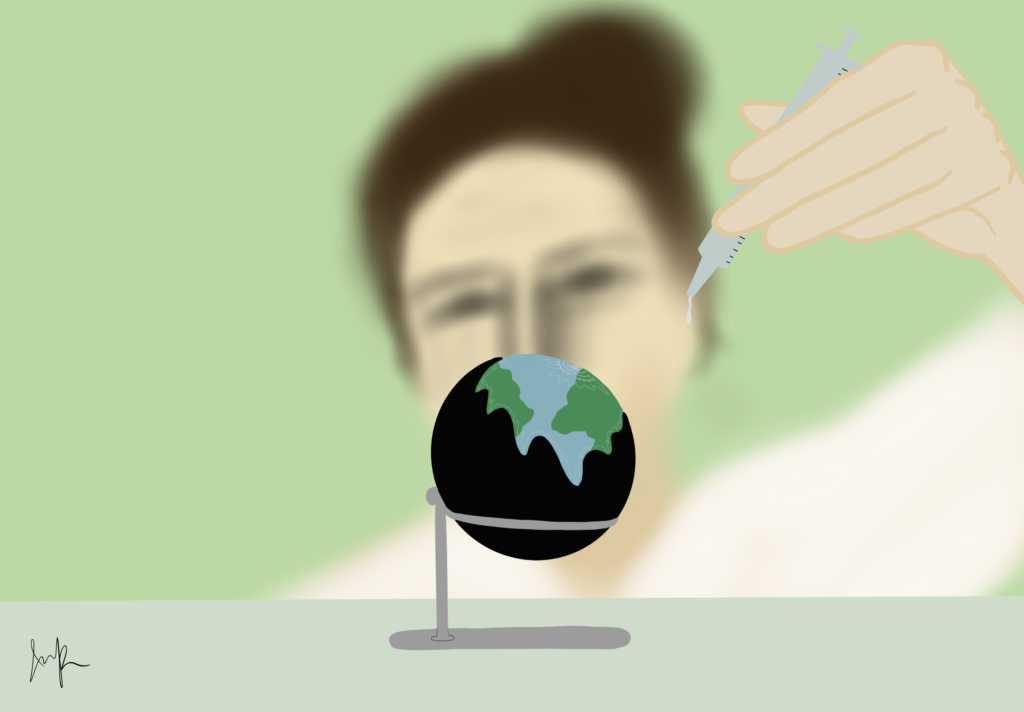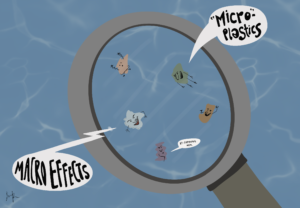
By Sarah Guan
When you think of a leader, people like Joe Biden come to mind because they have a leadership role. He’s the president. Presidents are the “leaders” of the United States; they lead and make laws for us. It makes sense that President Biden would come to mind. If you search “What is a leader?” on Google, pictures of President Biden, previous presidents, vice presidents, first ladies, and Vladimir Putin show up. Younger me probably also would’ve thought of a president because they were the only “leaders” I knew. That is until I learned about Marie Curie in school. Now, when I think of a leader, she instantly comes to mind.
Surprisingly, I never learned about her in any of my science classes, even though she contributed immensely to the fields of chemistry and physics. Granted, my classes focused more on the concepts and not on individual scientists. But as embarrassing as this is to admit, I only learned about Marie Curie in my sophomore year of high school (which was last year). I decided to take AP European History, and one of our projects was a quick 3-minute presentation on a historical figure. My classmates and I all chose a person from a thirty-person-long list. I chose someone that I had learned about: Louis Pasteur. One of my classmates chose Marie Curie.
For those in the same boat, as I once was, unfamiliar with Marie Curie, she’s a two-time winner of the Nobel Prize. Once for physics in 1903 and once for chemistry in 1911. On top of that, she is the first woman to get a Nobel Prize and the only woman to win twice. Impressive, right? Sure, people are probably looking for contemporary leaders, but it’s essential to acknowledge leaders from the past. Without them, we wouldn’t be in the present with all we have and know.
To begin, let’s define what a “leader” is. Google’s definition of a leader is people who lead something. In other words, anyone can be a leader, from politicians to teachers to peers to bosses. But there’s a difference between being a leader and being a “good” leader. Good leaders share traits like integrity, influence, and courage (“What Are The Characteristics and Qualities of a Good Leader”). Others include passion and commitment (Movement, “The Top 10 Qualities of a Good Leader”). Marie Curie embodies all of these characteristics, and I’ll explain how.
First, all leaders have integrity. Integrity holds a community together, and everyone looks up to those with integrity. In Marie Curie’s case, she displays her integrity with proper crediting after her discoveries. For example, while studying a mineral called “pitchblende” with her husband, Pierre, the two noticed an “unknown substance of very high activity.” By investigating this “unknown substance,” they discovered two new elements: polonium and radium. After this discovery, Marie Curie and another chemist, André-Louis Debierne, experimented with radium. The two managed to isolate pure metal radium (“Marie Curie”). Instead of taking full credit for this discovery, Marie ensured that Debierne got his proper recognition. Anyone with basic morals knows it’s common sense to credit others for their work, yet tons have stolen others’ work. As an artist, I’ve seen countless videos exposing “art plagiarizers” and “tracers.” Also, if you remember before, I mentioned how I had chosen Louis Pasteur for my presentation. While researching him, I found numerous exposés on Louis Pasteur, explaining that his journals exposed how he stole his colleagues’ work and passed it off as his own. Yikes.
Next, good leaders are influential. Following a leader’s example, others strive to be better. Leaders inspire others, and Marie Curie certainly inspired and influenced others. To begin, Curie worked at École Normale Supérieure and Sorbonne as a professor. Teachers are some of the most influential people in the world; they shape our thoughts, teaching us for seven hours a day, five days a week, thirty-six weeks a year. Thus, Marie Curie could easily influence the women that she taught. Furthermore, no one can deny the impact of her work on the fields of chemistry, physics, and medicine. Britannica describes her impact as “immense… because of her influence on subsequent generations of nuclear physicists and chemists.” These future physicists and chemists would use Curie’s work to discover neutrons and create artificial radioactivity (“Marie Curie”). Then, in the medical field, Marie and Pierre Curie discovered that radiation could kill “diseased cells” before it killed healthy cells. Thus, doctors began using radiation to treat illnesses. Future scientists would improve radiation technology so that it’s safer and more effective–such as radiation therapy to treat cancer. Also, radiation allowed for the development of x-rays, primarily used during the first World War. Marie Curie developed “radiological cars,” called petite Curies, which had x-ray machines so doctors could “x-ray wounded soldiers and operate more accurately” (“The Nobel Prize: Women Who Changed Science: Marie Curie.”). So technically, Marie Curie is also a war hero. Nevertheless, Curie has saved thousands of lives through doctors’ use of x-rays and radiation technology.
Furthermore, good leaders are courageous. They take charge when others won’t; they do what others won’t. I think that the “C” in Curie stands for courage. Before I start explaining, let me give a little context. In Europe, women have always had a domestic role. Sexism was prominent. I’ll give a few examples. First, during the Renaissance, when new universities began popping up, most women could not attend because they were women. Second, after the French Revolution, Napoleon established the Napoleonic Code, which restricted women’s rights. For instance, they lost their rights to divorce. Now let’s get back to Marie Curie. Born in 1867, when Curie was growing up in Poland, women weren’t allowed to go to university. What’s Curie’s solution? She moved to Paris to pursue her education (“Marie Curie.”). In the face of blatant sexism, Marie Curie was brave enough to leave her home so that she could pursue her dreams. She was brave enough to stand up for what was right.
Finally, good leaders are passionate and committed. As mentioned, Marie Curie lived in a period when sexism was prominent but found ways to pursue her passion. Curie was forbidden to go to university in Poland because of her gender, so she moved to Paris. She applied for a job at Krakow University but was rejected simply because of her gender. So, Curie moved back to Paris and got a job at École Normale Supérieure and Sorbonne, becoming the first female professor in both schools. Despite the sexism rampant in Europe, Marie Curie went beyond all odds, pursued her dreams, and became a professor. While others would have backed down, Marie Curie did not. She was determined to follow her dreams, and that same determination and passion make a great leader. Someone who does not stop when there’s an obstacle in their path. As a girl, it’s inspiring to see women follow their dreams, especially in an era when it was so difficult. It motivates me to pursue my dreams in engineering despite it being a man-dominated field.
Ultimately, Marie Curie would die of aplastic anemia, a side effect of her constant radiation exposure. So technically, her radioactivity studies would take her life. But don’t think of Curie as someone killed by her studies; remember everything she has discovered and done for us. Think of her as the leader she was, a pioneer in physics and chemistry. She was an incredible leader and role model, someone we should all respect.
Works Cited
“Marie Curie” Encyclopædia Britannica, Encyclopædia Britannica, Inc.,
https://www.britannica.com/biography/Marie-Curie.
“Marie Curie.” Atomic Heritage Foundation, 7 Nov. 1867,
https://www.atomicheritage.org/profile/marie-curie.
“What Are The Characteristics and Qualities of a Good Leader” CCL, 17 Aug. 2022,
https://www.ccl.org/articles/leading-effectively-articles/characteristics-good-leader/.
Movement, Red Shoe. “The Top 10 Qualities of a Good Leader” RED SHOE MOVEMENT, 15
May 2017, https://redshoemovement.com/top-10-qualities-of-a-good-leader/.
McHugh, Brendan. “Marie Curie: 7 Facts about the Groundbreaking Scientist.” Biography.com,
A&E Networks Television, 14 Dec. 2020,
https://www.biography.com/news/marie-curie-biography-facts.
“The Nobel Prize: Women Who Changed Science: Marie Curie.” The Official Website of the
Nobel Prize – NobelPrize.org,
https://www.nobelprize.org/womenwhochangedscience/stories/marie-curie.
The views and opinions expressed are those of the authors and do not necessarily reflect nor represent the Earth Chronicles and its editorial board.








